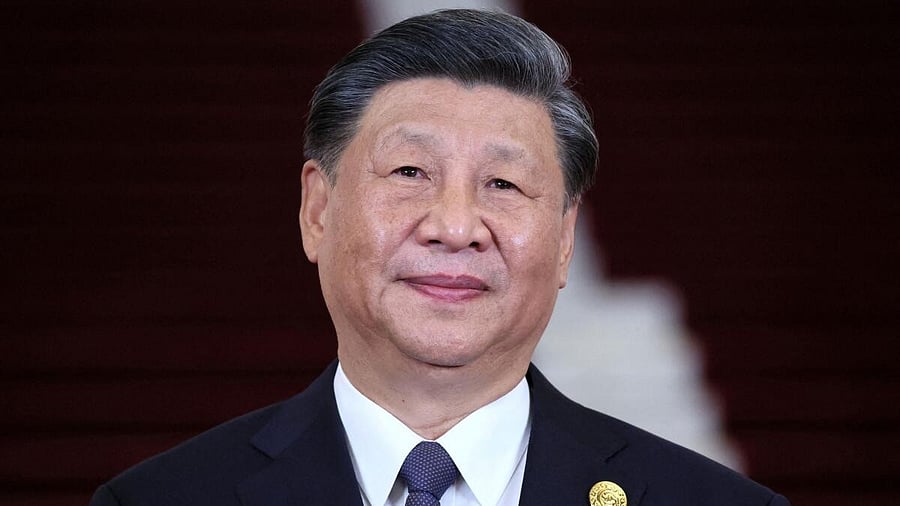
Chinese President Xi Jinping.
Credit: Reuters Photo
China's President Xi Jinping met with a group of American business leaders in Beijing including Blackstone Inc.’s Stephen Schwarzman and Qualcomm Inc.’s Cristiano Amon as China is seeking to restore confidence in the economy and keep relations with the US on a stable footing.
The Chinese leader met with representatives from American business, strategic and academic communities.
State broadcaster CCTV named the executives present and said they took a group photo before the event.
The meeting lasted more than an hour and a half, with delegates raising questions and Xi answering them, according to a person with knowledge of the matter, who asked not to be identified discussing a private event. Xi said he doesn’t see the need for Washington and Beijing to decouple, and that he wants American businesses to invest in China, the person said.
Xi also acknowledged issues with the domestic economy, adding that officials can handle them and the Chinese economy hasn’t peaked, the person said, describing the talks as open and frank.
China’s Ministry of Foreign Affairs did not immediately respond to a request for comment on the details of the meeting. It said during a regular briefing on Wednesday that Xi had stated China’s position to the CEOs.
Beijing is trying to show it welcomes foreign businesses, but whipsawing tensions with Washington, a shaky economic recovery and raids on consulting firms have damped investor enthusiasm. For global executives, the meeting was a chance to underscore interest in participating in the Chinese market despite deepening geopolitical tensions and moves in China to favor local competitors.
China and the US should “seek common ground on major issues while reserving differences on minor ones,” Xi said, according to CCTV. He added that he hopes for more exchanges between the people of both countries.
Other attendees include Raj Subramaniam, chief executive officer of FedEx Corp.; Evan Greenberg, CEO of the insurer Chubb Ltd.; Stephen Orlins, president of the National Committee on US-China Relations; Craig Allen, president of the US-China Business Council; and Mark Carney, chairman of Bloomberg Inc.
Xi also talked about avoiding the “Thucydides Trap,” describing an inevitable conflict between a rising power and an established one, according to Harvard scholar Graham Allison, who attended the meeting on Wednesday. The president said the US and China must balance their competition with recognition that each nation’s survival requires that they simultaneously cooperate, Allison added.
US-China ties have stabilized after Xi met with President Joe Biden in San Francisco in November, although they continue to dispute over a broad range of issues spanning trade curbs and accusations of cyberattacks.
On Tuesday, China said it filed a complaint to the World Trade Organization over US electric vehicle subsidies. Earlier in the week, the US and UK accused state-backed Chinese hackers of targeting politicians, companies and dissidents, as well as stealing troves of British voter data.
Relations with the US risk worsening with former President Donald Trump already vowing massive on the campaign trail that could shrink trade between the two nations to practically nothing. Trump’s rhetoric may add pressure on Biden to take harsher measures in the run-up to election day.
China appears to be ramping up outreach to foreign investors as it seeks to achieve an annual growth target of around 5%, a goal deemed ambitious by some economists. The Ministry of Commerce in January pledged to hold a round-table meeting with foreign companies every month to hear and address their concerns.
However, investors have complained about whiplash as China pursues its dual goals of development and security, with executives hearing warm words only to then see authorities probe consultancy firms, expand a vague anti-spy law and restrict access to data. A structural economic slowdown has also led executives to re-evaluate the balance between risks and rewards for operating in the country.
Prior to the pandemic, Xi used to hold more regular gatherings with executives at events such as the annual Boao Forum for Asia, which is sometimes described as China’s Davos. He’s not expected to attend this year’s conference, which started Tuesday in Hainan.
Many US CEOs are in Beijing for the annual China Development Forum, which gathers together global business leaders and Chinese officials. Some executives attending the confab extended their stay or moved previously planned appointments in order to meet with Xi after receiving a formal invitation last week, Bloomberg News reported.